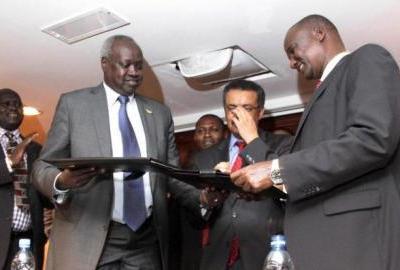South Sudanese government to cater for opposition members’ hotels bill
January 22, 2016 (JUBA) – South Sudanese government has announced to take over accommodation bills for SPLM in opposition advance team in Juba after Troika countries ended their support on Friday. It also appealed for more needed time to prepare a new constitution before a unity government can be formed.

“The government will pay for the hotel accommodation and everything required by SPLM/A in opposition advance team despite the severe financial constraints under which the government of South Sudan is currently operating,” said Nhial, flanked by deputy government’s negotiator and information minister, Michael Makuei Lueth, and finance minister, David Deng Athorbei.
“It (government) shall still strive to cater for the accommodation and needs of the SPLM/A IO advance team. There is no going back to war. We shall all work for peace, build confidence among the parties and the citizens of the republic of South Sudan,” he said.
Troika countries – the United States, Norway and Great Britain – said in a joint statement on Thursday that they will end accommodation of 240 members of the SPLM-IO advance team in Juba due to failure to a form transitional government of national unity by the two parties.
Nhial called on South Sudanese “to beat the drum of peace and not the drum of war.”
“The leadership of SPLM/A-IO advance team went to Pagak for consultations with their leadership. Their absence should not be a cause for alarm. Upon their return, the government should continue to work jointly with them on the implementation of the agreement,” he said.
The Chief Negotiator, who was absent from the country for many months since the signing of the peace deal in August 2015 by his boss, President Salva Kiir with former vice-president, Riek Machar, claimed that the government was committed to peace despite its insistence to impose on the constitution 28 which were not provided for in the agreement.
NO RUSH TO TGONU FORMATION
The lead chief negotiator for the government however said it was not practically realistic to form a government of national unity (TGoNU) soon, citing need for more time to do things in a correct way as per the agreement.
Nhial, also former foreign minister in South Sudan, on Thursday explained that the process of the implementation should not be rushed as some provisions including the amendment of the constitution needed more time of at least four more weeks before a unity government can be formed.
“It requires at least four weeks before the actual debate [on the constitution] can start. You notice here that it would require some time to reach the formation of the transitional government of national unity,” he said, without elaborating when that procedure will start.
There is a standoff over the number of the states and delay to write a new constitution that incorporates the peace agreement and recognizes the TGoNU. Others include implementation of the security arrangements, but the government says it cannot be able to demilitarize Juba by withdrawing its forces to 25km per the agreement due to lack of money to establish military camps outside the capital.
A joint military and police forces are also supposed to be deployed in the capital by the two parties, with a total of 8,000 in number. All these processes were supposed to be implemented during an expired 90 days of pre-transitional period before a government of national unity can be formed.
“Those are the processes that cannot be squeezed,” Nhial said.
(ST)?
